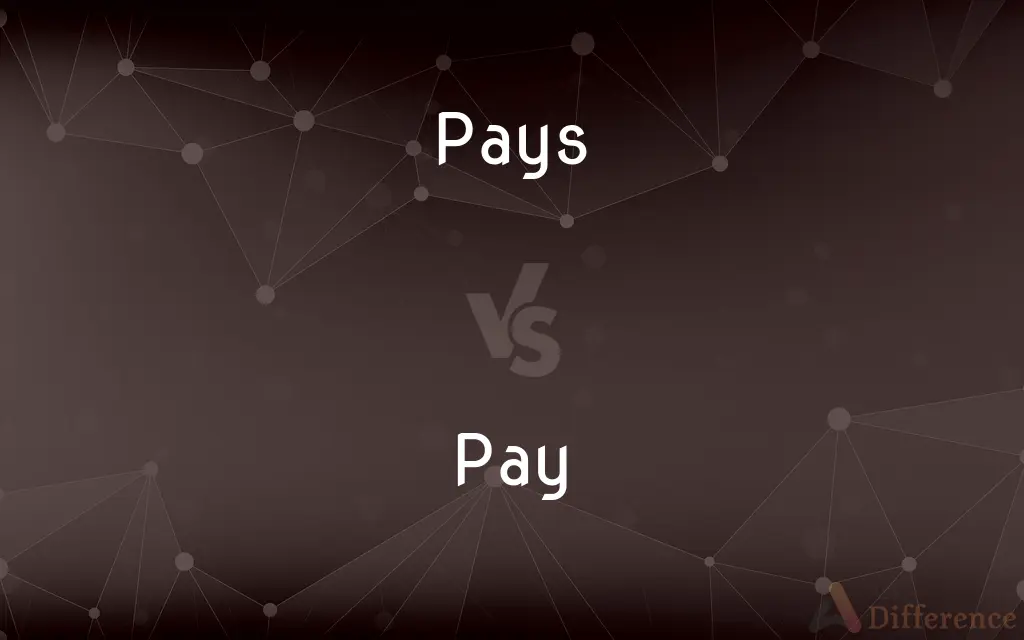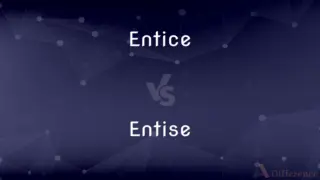Pays vs. Pay — What's the Difference?
By Urooj Arif & Fiza Rafique — Updated on May 17, 2024
"Pays" is the third-person singular present form of the verb "pay," while "Pay" is the base form and also functions as a noun referring to compensation or salary.

Difference Between Pays and Pay
Table of Contents
ADVERTISEMENT
Key Differences
"Pays" is the third-person singular present tense of the verb "pay," used when referring to a single subject like he, she, or it. It indicates the action of giving money in exchange for goods, services, or to settle a debt, occurring right now.
"Pay" is the base form of the verb used in different tenses and subjects (e.g., I pay, you pay, we pay). It can also function as a noun, referring to the amount of money received for work performed, also known as salary or wages.
"Pays" is specifically used in sentences to indicate that a third person or entity is performing the action of paying. "Pay" as a verb can be used with any subject, while as a noun, it denotes the concept of monetary compensation.
In professional contexts, "pays" might be used to describe an employer or system that provides compensation (e.g., "The company pays its employees well"), whereas "pay" can refer to both the action of giving money (e.g., "I pay my bills on time") and the salary itself (e.g., "Her pay is competitive").
Comparison Chart
Part of Speech
Verb (third-person singular present)
Verb (base form), Noun
ADVERTISEMENT
Usage Context
He/She/It pays
I/You/We/They pay, Salary
Example Sentence (Verb)
E.g., "She pays her rent monthly."
E.g., "I pay my taxes annually."
Example Sentence (Noun)
-
E.g., "His pay is deposited weekly."
Subject
Third-person singular
Any subject
Compare with Definitions
Pays
To settle a debt.
He pays his loan installments every month.
Pay
To settle a financial obligation.
We need to pay the utility bills.
Pays
To bear the cost of something.
The government pays for public services.
Pay
To give money to in return for goods or services rendered
Pay the cashier.
Pays
Third-person singular present form of "pay."
She pays her bills on time.
Pay
To give (money) in exchange for goods or services
Paid four dollars for a hamburger.
Paid an hourly wage.
Pays
To give money to in return for goods or services rendered
Pay the cashier.
Pay
To discharge or settle (a debt or obligation)
Paying taxes.
Paid the bill.
Pays
To give (money) in exchange for goods or services
Paid four dollars for a hamburger.
Paid an hourly wage.
Pay
To bear (a cost or penalty, for example) in recompense
She paid the price for her unpopular opinions.
Pays
To discharge or settle (a debt or obligation)
Paying taxes.
Paid the bill.
Pay
To yield as a return
A savings plan that paid six percent interest.
Pays
To bear (a cost or penalty, for example) in recompense
She paid the price for her unpopular opinions.
Pay
To afford an advantage to; profit
It paid us to be generous.
Pays
To yield as a return
A savings plan that paid six percent interest.
Pay
To give or bestow
Paying compliments.
Paying attention.
Pays
To afford an advantage to; profit
It paid us to be generous.
Pay
To make (a visit or call).
Pays
To give or bestow
Paying compliments.
Paying attention.
Pay
Past tense and past participle paidor payed (pād) To let out (a line or cable) by slackening.
Pays
To make (a visit or call).
Pay
To give money in exchange for goods or services.
Pays
Past tense and past participle paidor payed (pād) To let out (a line or cable) by slackening.
Pay
To discharge a debt or obligation.
Pays
To give money in exchange for goods or services.
Pay
To bear a cost or penalty in recompense
You'll pay for this mischief!.
Pays
To discharge a debt or obligation.
Pay
To be profitable or worthwhile
It doesn't pay to get angry.
Pays
To bear a cost or penalty in recompense
You'll pay for this mischief!.
Pay
To coat or cover (seams of a ship, for example) with waterproof material such as tar or asphalt.
Pays
To be profitable or worthwhile
It doesn't pay to get angry.
Pay
Of, relating to, giving, or receiving payments.
Pays
To coat or cover (seams of a ship, for example) with waterproof material such as tar or asphalt.
Pay
Requiring payment to use or operate
A pay toilet.
Pays
Of, relating to, giving, or receiving payments.
Pay
Yielding valuable metal in mining
A pay streak.
Pays
Requiring payment to use or operate
A pay toilet.
Pay
The act of paying or state of being paid.
Pays
Yielding valuable metal in mining
A pay streak.
Pay
Money given in return for work done; salary; wages.
Pays
The act of paying or state of being paid.
Pay
Recompense or reward
Your thanks are pay enough.
Pays
Money given in return for work done; salary; wages.
Pay
Retribution or punishment.
Pays
Recompense or reward
Your thanks are pay enough.
Pay
Paid employment
The workers in our pay.
Pays
Retribution or punishment.
Pay
A person considered with regard to that person's credit or reliability in discharging debts.
Pays
Paid employment
The workers in our pay.
Pay
(transitive) To give money or other compensation to in exchange for goods or services.
He paid him to clean the place up
He paid her off the books and in kind where possible
Pays
A person considered with regard to that person's credit or reliability in discharging debts.
Pay
(ambitransitive) To discharge, as a debt or other obligation, by giving or doing what is due or required.
She offered to pay the bill
He has paid his debt to society
Pays
Plural of pay
Pay
(transitive) To be profitable for.
It didn't pay him to keep the store open any more.
Pays
To reward or compensate.
The job pays well for the work done.
Pay
(transitive) To give (something else than money).
To pay attention
Pay
(intransitive) To be profitable or worth the effort.
Crime doesn’t pay
It will pay to wait
Pay
(intransitive) To discharge an obligation or debt.
He was allowed to go as soon as he paid.
Pay
(intransitive) To suffer consequences.
He paid for his fun in the sun with a terrible sunburn.
Pay
(transitive) To admit that a joke, punchline, etc., was funny.
I'll pay that.
Pay
To cover (the bottom of a vessel, a seam, a spar, etc.) with tar or pitch, or a waterproof composition of tallow, resin, etc.; to smear.
Pay
Money given in return for work; salary or wages.
Many employers have rules designed to keep employees from comparing their pays.
Pay
Operable or accessible on deposit of coins.
Pay
Pertaining to or requiring payment.
Pay
To cover, as bottom of a vessel, a seam, a spar, etc., with tar or pitch, or waterproof composition of tallow, resin, etc.; to smear.
Pay
To satisfy, or content; specifically, to satisfy (another person) for service rendered, property delivered, etc.; to discharge one's obligation to; to make due return to; to compensate; to remunerate; to recompense; to requite; as, to pay workmen or servants.
May no penny ale them pay [i. e., satisfy].
[She] pays me with disdain.
Pay
Hence, figuratively: To compensate justly; to requite according to merit; to reward; to punish; to retort or retaliate upon.
For which, or pay me quickly, or I'll pay you.
Pay
To discharge, as a debt, demand, or obligation, by giving or doing what is due or required; to deliver the amount or value of to the person to whom it is owing; to discharge a debt by delivering (money owed).
Have patience with me, and I will pay thee all.
If they pay this tax, they starve.
Pay
To discharge or fulfill, as a duy; to perform or render duty, as that which has been promised.
This day have I paid my vows.
Pay
To give or offer, without an implied obligation; as, to pay attention; to pay a visit.
Not paying me a welcome.
Pay
To give a recompense; to make payment, requital, or satisfaction; to discharge a debt.
The wicked borroweth, and payeth not again.
Pay
Hence, to make or secure suitable return for expense or trouble; to be remunerative or profitable; to be worth the effort or pains required; as, it will pay to ride; it will pay to wait; politeness always pays.
'T was I paid for your sleeps; I watched your wakings.
Pay
Satisfaction; content.
Pay
An equivalent or return for money due, goods purchased, or services performed; salary or wages for work or service; compensation; recompense; payment; hire; as, the pay of a clerk; the pay of a soldier.
Where only merit constant pay receives.
There is neither pay nor plunder to be got.
Pay
Something that remunerates;
Wages were paid by check
He wasted his pay on drink
They saved a quarter of all their earnings
Pay
Give money, usually in exchange for goods or services;
I paid four dollars for this sandwich
Pay the waitress, please
Pay
Convey, as of a compliment, regards, attention, etc.; bestow;
Don't pay him any mind
Give the orders
Give him my best regards
Pay attention
Pay
Do or give something to somebody in return;
Does she pay you for the work you are doing?
Pay
Bear (a cost or penalty), in recompense for some action;
You'll pay for this!
She had to pay the penalty for speaking out rashly
You'll pay for this opinion later
Pay
Cancel or discharge a debt;
Pay up, please!
Pay
Bring in;
Interest-bearing accounts
How much does this savings certificate pay annually?
Pay
Render;
Pay a visit
Pay a call
Pay
Be worth it;
It pays to go through the trouble
Pay
Dedicate;
Give thought to
Give priority to
Pay attention to
Pay
Discharge or settle;
Pay a debt
Pay an obligation
Pay
Make a compensation for;
A favor that cannot be paid back
Pay
To give money for goods or services.
I pay for my groceries every week.
Pay
To compensate someone for work.
They pay their employees every Friday.
Pay
To yield a return.
Investments in education pay off.
Pay
To make a visit or call.
I will pay a visit to my grandparents.
Common Curiosities
Can "pay" be used with any subject?
Yes, "pay" as a verb can be used with I, you, we, they, and as a noun.
What does "pays" mean?
It is the third-person singular present tense of "pay."
What does "pay" mean as a noun?
It refers to the money received as salary or wages.
Is "pay" used differently in British and American English?
The usage is largely the same in both variants of English.
Can "pays" be used with any subject?
No, "pays" is used only with third-person singular subjects.
Can "pay" be used in continuous tense?
Yes, e.g., "I am paying the bill."
What is the plural form of "pay" when used as a noun?
"Pays" can be used, but it's less common; "payments" is more frequent.
What is an example sentence with "pays"?
"He pays his rent on the first of every month."
Does "pays" indicate a recurring action?
It can, e.g., "He pays his subscription monthly."
What does "pay" mean as a verb?
It means to give money for goods, services, or to settle a debt.
What is an example sentence with "pay" as a noun?
"Her pay is competitive."
Can "pay" imply non-monetary compensation?
Yes, it can imply any form of compensation or reward.
What is an example sentence with "pay" as a verb?
"I pay my taxes annually."
Is "pays" used in past tense?
No, "paid" is the past tense form of "pay."
How does context determine the use of "pay" and "pays"?
"Pays" is used with third-person singular subjects, while "pay" as a verb can be used with all subjects, and as a noun, it refers to salary or wages.
Share Your Discovery

Previous Comparison
Entice vs. Entise
Next Comparison
Churchyard vs. GraveyardAuthor Spotlight
Written by
Urooj ArifUrooj is a skilled content writer at Ask Difference, known for her exceptional ability to simplify complex topics into engaging and informative content. With a passion for research and a flair for clear, concise writing, she consistently delivers articles that resonate with our diverse audience.
Co-written by
Fiza RafiqueFiza Rafique is a skilled content writer at AskDifference.com, where she meticulously refines and enhances written pieces. Drawing from her vast editorial expertise, Fiza ensures clarity, accuracy, and precision in every article. Passionate about language, she continually seeks to elevate the quality of content for readers worldwide.













































